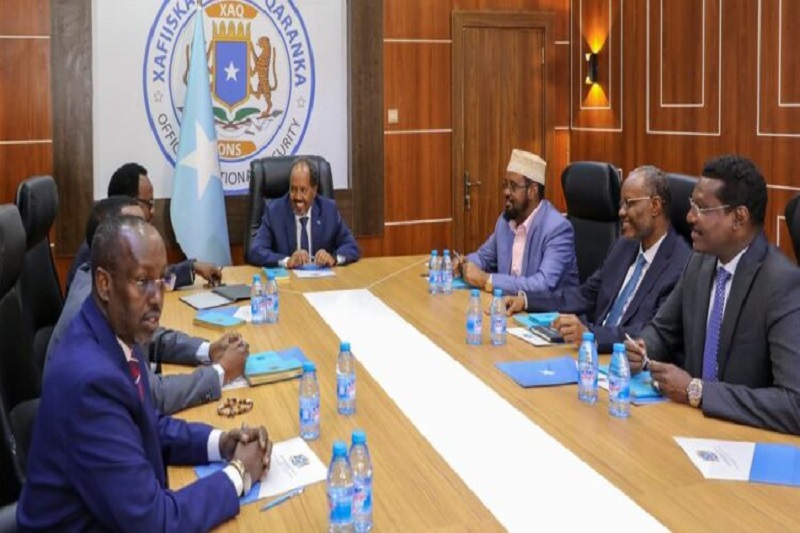An agreement that was struck on Sunday between the government and the federated states of Somalia provides for the implementation of direct universal suffrage beginning in 2024 as well as the transition to a presidential system. This marks the beginning of an overhaul of Somalia’s political structure, which was made public on Sunday.
The promise of a vote based on the principle of “one person, one vote” has been made numerous times but has never been put into reality. The agreement, which requires Parliament’s approval, aims to carry out this promise starting with the scheduled municipal elections on June 30, 2024. After these, on November 30, 2024, elections will be held for regional parliaments and presidents of the respective regions.
After the dictator Siad Barre took power in this Horn of Africa country in 1969, this idea of direct universal suffrage was abolished. “We have decided to return decision-making to the people, so that the voice of the Somali citizen becomes valuable in matters relating to his future,” said President Hassan Sheikh Mohamoud during a press conference on Sunday, alongside numerous leaders of federated states. “We must get out of the fear in which we have been trapped for 20 or 30 years and move on to holding democratic elections in this country: a “one person, one vote” election, both at the federal and state levels,” he added.
Related Posts
Following the civil war that ensued after Siad Barre’s overthrow in 1991, Somalia’s political structure became centered on the numerous clans and sub-clans that are a part of the country’s population. Elections have been held in the past through a convoluted and indirect method. This has been a source of power conflicts and instability, which, according to many analysts, has aided the radical Islamist Shebab insurgency that has been wreaking havoc on the country since 2007.
Hassan Sheikh Mohamoud, who was elected for a second term in May 2022 (after his first term, which lasted from 2012–2017), made a commitment in March that the following national and regional elections would be held according to the principle of “one person, one vote” in May. This week, a first step was taken with the initiative of the semi-autonomous northern state of Puntland, which arranged its district council elections in accordance with this idea. The voting process was commended and held up as a model by members of the worldwide community.
In addition to the method of voting, the agreement specifies a more comprehensive revamp of Somalia’s political structure, which includes the implementation of a presidential system to replace the current parliamentary method of government. This will take place after the next presidential election. “In order to harmonize elections in the Federal Republic of Somalia, the country will adopt a system of president and vice president elected on a single ballot paper,” the signatories explain in a press release.
This so-called “presidential ticket” puts an end to the position of Prime Minister. The next election for president is not expected to take place until May 2026. The results of the local council elections will serve as the basis for the national elections, which will only feature two parties and use a “closed-list proportional system.” According to the explanation provided in the text, the two political parties that received the majority of votes in the local elections will be national political parties that compete for seats in Parliament and the White House.
Hassan Sheikh Mohamoud, Prime Minister Hamza Abdi Barre, and the leaders of the federated states came to this agreement at the conclusion of a four-day conference of the National Consultative Forum. The meeting brought together all of these individuals. Sa’iad Abdullahi Deni, the current President of the State of Puntland in Somalia, was not present when the agreement was signed.
The text is a significant advance in the right direction. Hassan Sheikh Mohamoud’s predecessor, Mohammed Abdullahi Mohamed, sometimes known as “Farmajo,” had expressed his wish to organize elections on the concept of “one person, one vote,” but he was unable to do so due to difficulties with specific states. Hassan Sheikh Mohamoud’s goal is to arrange elections on this principle.
Hassan Sheikh Mohamoud has made it a priority, ever since he was elected president, to free Somalia from the perpetual state of instability in which it has been mired for the better part of three decades. In particular, he has launched an “all-out war” against the extreme Islamist Shebab, which is a group that is associated with al-Qaeda and has been fighting the internationally supported federal government for over 15 years in order to establish Islamic rule in the country.
The president launched a military operation in September, and with the assistance of the African Union (Atmis) and American airstrikes, the group has been able to retake territory in the country’s central region.
The Shebab were successful in driving the group out of the main towns in 2011 and 2012, but they have maintained a strong presence in the vast rural areas. In addition, the nation is dealing with a humanitarian crisis as a result of a severe drought that started at the end of the year 2020 as well as floods that have occurred in recent weeks.

